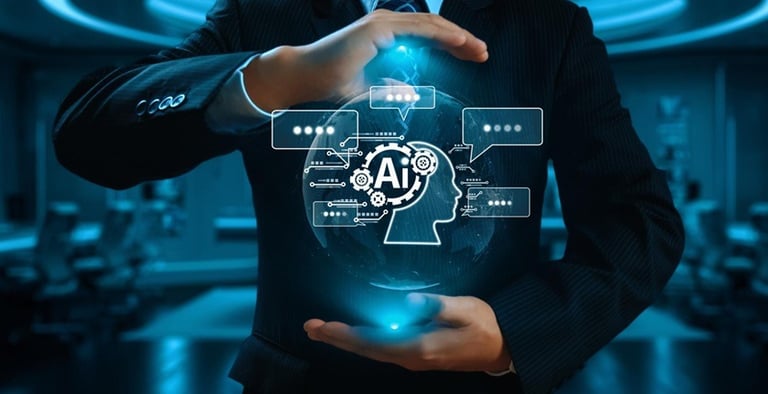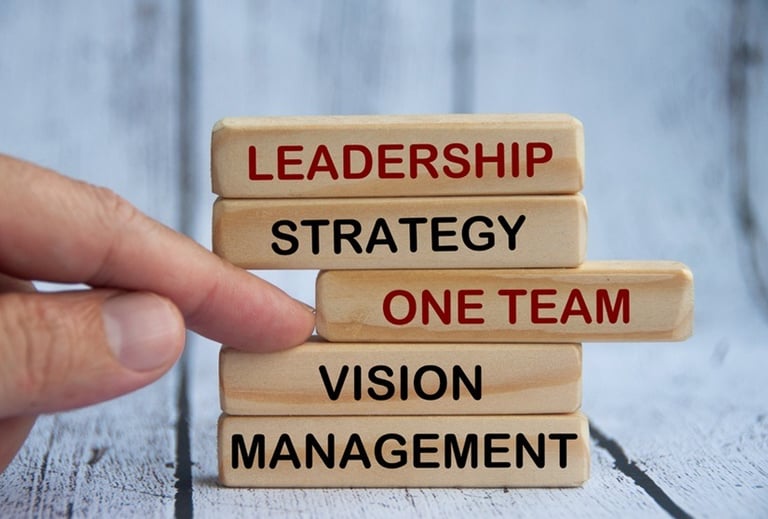HR Trends 2025 - What is shaping HR and the future of the work?
The world of HR is constantly evolving, and 2025 will be no exception. The economic and labor market trends of 2025 are expected to bring significant challenges for both employers and employees. Technological advancements, shifting employee expectations, and the changing economic environment are all shaping the way organizations recruit, develop, and retain talent. But what should HR professionals focus on in 2025? Let’s take a look at the most important market changes and trends.
What kind of market changes have been observed recently?
According to analyses, business leaders and employers tend to be optimistic in the short term, expecting global economic growth. However, in the long term, they express concern due to the perceived unpredictability of the future. The emergence of artificial intelligence, sustainability expectations (ESG), and various industry-specific trends are driving a complete transformation across nearly every sector.
Economic uncertainty is significantly impacting employment, with unemployment rates rising and recruitment processes slowing down as a result.
The IT and tech sectors have already been experiencing a downturn for some time.
Wage tensions are emerging in the labor market, as inflation and the current economic uncertainty are widening the gap between employee salary expectations and corporate capabilities. This growing disparity is likely to increase employee turnover and dissatisfaction.
Another influential factor is the aging population, which suggests that labor shortages will become even more acute in the long term.
The explosion of technology is rapidly making existing employee skillsets obsolete. With the rise of AI and automation, workers will increasingly need to acquire new competencies and enhance their digital skills.
These market and economic changes are fundamentally reshaping how HR operates. In the coming years, digitalization, artificial intelligence, employee experience, leadership development, reskilling, acquiring new capabilities, pay transparency, and sustainability considerations will gain even greater emphasis, as organizations must adapt to a rapidly changing labor market environment.
What Are the Most Important HR Trends in 2025?
The role of HR as a business support function continues to grow year by year. The focus has long since shifted away from administrative tasks, and is now increasingly on how HR decisions directly impact revenue, productivity, retention, engagement, and cost savings. HR is no longer merely a support function—it has become a strategic player that drives and assist business growth and efficiency. Looking ahead, the trend points to administrative duties being largely taken over by enterprise resource planning systems, self-service HR tools, and artificial intelligence. As a result, HR professionals are expected to focus less on administration and more on optimizing workflows, rethinking organizational structures, and advancing digitalization and automation. In addition, key priorities include the development of compensation and incentive systems, training programs, performance management, and strategic operations.
Artificial intelligence is increasingly being integrated into HR processes—not to replace HR professionals, but to support their work. AI enables HR teams to handle time-consuming administrative tasks more efficiently, freeing up time and resources for strategic decisions and human interaction. Which processes can AI assist with?
One of AI’s biggest advantages in HR is its ability to streamline recruitment processes. AI can screen résumés, conduct preliminary candidate evaluations, and automate communication. AI-powered chatbots can interact with job seekers, schedule interviews, and even conduct preliminary assessments, resulting in significant time and resource savings for HR teams. While AI can automate tasks like pre-screening, responsibilities such as conducting interviews, assessing team fit, and making final hiring decisions will still rely heavily on human judgment.
✅ Automated recruitment


✅ HR metrics, data collection, and analysis
HR analytics is also undergoing a revolutionary transformation. With the help of AI, companies can more accurately predict employee turnover, identify critical areas for performance management, and monitor employee satisfaction. This data-driven approach empowers leaders to make objective decisions aimed at improving employee engagement and motivation. For example, AI can detect early warning signs of dissatisfaction or burnout in employees, allowing HR to intervene with appropriate measures in a timely manner.
✅ Personalized learning paths
Supporting employee development through personalized learning paths is another key area where AI can have a significant impact. Intelligent systems can analyze employees’ skills, interests, and career goals to provide tailored training recommendations that truly support their professional advancement. In a rapidly evolving labor market, continuous learning is becoming increasingly important. AI-powered e-learning platforms help employees keep their knowledge up to date, ensuring they remain competitive and capable in their roles.
✅HR Administration and automated document generation
HR administration has traditionally included time-consuming tasks such as preparing contracts, managing employment documentation, processing attendance records, and payroll-related administration. Modern AI-powered systems now allow these processes to be automated with minimal human intervention, reducing the likelihood of errors and speeding up operations. Document management systems can automatically generate contracts, certificates, and other HR-related documents based on templates. Paperless, digital HR administration is not only more sustainable but also more cost-effective, as it significantly reduces administrative workload and human resource demands.
✅HR Customer support
One of the most important yet often undervalued responsibilities of HR departments is supporting employees and answering their everyday questions. Traditional HR support channels frequently involve long wait times for employees seeking answers to basic, repetitive questions—such as those related to leave requests or HR policies. AI-powered chatbots and virtual assistants are revolutionizing this area. Artificial intelligence can provide real-time responses to fundamental HR inquiries, allowing HR teams to focus on more complex and personalized matters. AI-driven support systems offer instant access to company policies, current HR processes, and employee data, enabling staff to get the information they need faster and more efficiently. These systems also have the ability to learn over time, becoming increasingly adept at identifying employee needs and delivering more tailored responses. By reducing the administrative burden on HR professionals and enhancing responsiveness, chatbots and AI assistants improve employee satisfaction and streamline internal communication.
The future of HR is not about choosing between humans and machines, but about integrating technology with human intelligence to achieve the best possible outcomes. Organizations that succeed in creating this synergy will gain a competitive edge in the constantly evolving labor market.
In today’s labor market, offering competitive salaries alone is no longer enough for companies to remain attractive and retain talent. Employees are increasingly seeking workplaces where they feel valued and where their well-being is prioritized.
Ensuring a healthy work-life balance has become a critical component of employer branding. Demand for flexible work hours, remote work, and four-day workweeks is no longer just a trend—it’s a response to the challenges of modern lifestyles. Hybrid work arrangements not only boost employee satisfaction but also help reduce turnover by offering greater autonomy and better time management. Companies that insist on rigid, office-bound schedules are finding it increasingly difficult to retain skilled professionals.
✔️Work-life balance
✔️Company culture as a retention tool
✔️Mental health support
Mental health support also plays a crucial role in strengthening employer branding. Burnout has become one of the most pressing workplace issues, leading to reduced individual performance, higher turnover, and lower engagement over time. Stress management should not be considered solely the responsibility of the individual—employers must take an active role in this area. Regular mental health programs, access to psychological support, balanced workloads, and an open, supportive workplace culture all contribute to employee well-being.
In recent years, company culture has taken on a new level of importance. A strong brand and a well-known company name are no longer sufficient to ensure long-term employee loyalty. Increasing research shows that factors such as leadership attitude, peer relationships, and a sense of workplace community have a far greater impact. Organizations in which leaders communicate transparently, support employee development, and prioritize internal cohesion experience lower turnover—even when competitors offer higher salaries. A culture of recognition, opportunities for growth, and actively listening to employee feedback are all critical elements that enhance the appeal of a company’s internal culture.


A positive internal culture doesn’t just stay inside the company—it radiates outward. Satisfied and engaged employees become the best brand ambassadors, sharing their positive experiences, recommending the company to others, and actively contributing to employer branding efforts. When a company neglects its internal culture, it will eventually affect its external reputation, leading to disadvantages in attracting and retaining top talent.
In conclusion, employer branding is no longer just one element of HR strategy—it has become a cornerstone of business success. The question is no longer whether a company can afford to implement these measures, but whether it can afford not to.
Due to ongoing changes in the labor market, companies are increasingly shifting toward skill-based recruitment strategies. While in the past, a degree or institutional qualification was the primary criterion in candidate selection, today it's far more important what skills and experience a candidate actually possesses. With automation, technological advancement, and the emergence of new job roles, employers are prioritizing hands-on expertise and demonstrable abilities over traditional educational credentials. In sectors like IT, creative industries, marketing, and tech development, an applicant’s portfolio, project work, and relevant skills now weigh more heavily than the name of the university they attended.
✔️Reskilling and upskilling
✔️Soft skills take center stage
Soft skills—such as communication, adaptability, and problem-solving—have become essential across nearly all job roles. Employees who can learn quickly, collaborate effectively, and respond creatively to challenges are viewed as far more valuable than those who merely hold formal qualifications but struggle to apply their knowledge in practice.
Due to rapid technological evolution, increasing emphasis is placed on reskilling and upskilling—i.e., the continuous training and retraining of current employees. As workplaces rapidly changing, many of today’s job roles will undergo major transformations within a few years. Companies that recognize this and invest in internal training gain a competitive edge, as they can repurpose existing talent for new roles rather than constantly searching for external hires.
Modern recruitment strategies must adapt to these changes by placing greater focus on skills-based assessments. During interviews, it is advisable to create scenarios where candidates can demonstrate problem-solving abilities, teamwork, and creative thinking. Competency-based tests, practical exercises, and real-world project evaluations provide a more reliable picture of a candidate’s suitability than simply verifying academic qualifications.
For companies today, financial results are no longer the sole priority—equally important is their impact on society and the environment. ESG (Environmental, Social, and Governance) principles are increasingly shaping corporate strategies, and one of the key areas of implementation is HR. Sustainable HR is not just a trend; it is a long-term, value-creating approach that enhances a company’s appeal to both employees and partners.
✔️True implementation of diversity
It’s no longer enough to simply talk about diversity—concrete actions are required. Companies must actively create equal opportunities in the labor market and support the integration of employees from diverse backgrounds, mindsets, and abilities. An inclusive and open workplace culture is not only vital for social equity, but also promotes innovation and creativity.
✔️Green HR practices
Another important aspect of sustainability is the adoption of green HR practices that help reduce a company’s ecological footprint. Paperless operations, energy-efficient office environments, support for sustainable commuting options, and eco-friendly employee programs all contribute to environmental protection. A responsible HR strategy not only enhances corporate image but can also lead to more cost-effective and sustainable operations in the long run.


✔️Social responsibility
Corporate Social Responsibility (CSR) is also becoming an increasingly important factor in employee decision-making. People are no longer just looking for a “job”—they want to work for companies that create real value for society. Charitable programs, volunteer initiatives, and equal pay policies all help position an organization as a responsible and attractive employer. Companies that actively engage in addressing social and environmental challenges not only attract more committed employees but also build stronger customer relationships.


Today’s workplaces bring together multiple generations—from Generation X and Y to Generation Z. Each age group has its own working style, technological fluency, and motivational drivers. While older generations tend to value stability and personal relationships, younger workers are more drawn to flexibility, digital tools, and fast career progression. For companies, it is crucial to recognize these differences and implement strategies that create a supportive and attractive workplace for all generations. This includes fostering understanding and collaboration across age groups to strengthen cohesion and improve teamwork.
The European Union’s new Pay Transparency Directive is set to bring significant changes to the labor market. Its goal is to reduce the gender pay gap and increase transparency in compensation. Member states must implement the directive by June 7, 2026, and companies need to begin preparing now. There are four key components companies should be ready for:
✔️Pay transparency for job seekers
✔️Right to pay information for employees
✔️Pay reporting obligations
Candidates must be informed of the salary range for a position before the interview. Employers will also be prohibited from asking about an applicant’s previous salary.
Employees will have the right to request information about their individual pay level and the average pay levels broken down by gender for employees performing the same or equivalent work.
✔️The right to compensation for employees
Employers with 250 or more employees until 7 June 2027, and annually thereafter,
Employers with 150-249 employees by 7 June 2027 and every three years thereafter,
Employers with 100-149 employees must report on the gender pay gap by 7 June 2031 and every three years thereafter
If the reported data reveals a gender pay gap greater than 5% that cannot be justified by objective, gender-neutral criteria, the employer must take corrective action in the form of a joint pay assessment with employee representatives.
Employees will be entitled to compensation if wage discrimination can be proven. In such cases, it will be the employer's responsibility to prove that they have complied with EU rules on equal pay and pay transparency. While large corporations generally operate with well-defined compensation frameworks, small and medium-sized enterprises in Hungary still have significant work to do to meet the requirements of the EU directive.
Today’s effective leaders don’t just delegate tasks and monitor performance—they support, listen to, and develop their teams. Leaders who build trust, motivate, and inspire not only enhance performance but also contribute to long-term employee commitment and loyalty.
✔️Leadership development
✔️Mentoring and coaching as the foundation
Continuous leadership development requires a strong mentoring and coaching culture integrated into corporate strategy. Successful companies understand that leadership skills are not static—they can and should be developed. For this reason, more organizations are implementing regular coaching programs. Mentoring new leaders, leadership training, and personalized development opportunities not only improve individual performance but also strengthen organizational culture. A leader is truly effective only when they are committed to learning and open to feedback.
✔️Identifying and addressing toxic leadership
Recognizing and addressing poor leadership styles is also vital. More companies are using 360-degree feedback and anonymous employee satisfaction surveys to identify leaders who may undermine morale or hinder team development. A bad manager not only reduces productivity but is a leading cause of employee turnover—people often leave managers, not jobs. That’s why organizations must proactively address such issues and provide development opportunities to leaders who need improvement.
Leadership development is not a one-time task but an ongoing process essential to long-term organizational success. A strong, empathetic, yet effective leadership team boosts employee engagement, improves workplace atmosphere, and drives innovation. For modern companies, the question is no longer whether it’s worth investing in leadership development, but whether they can afford not to.
✔️Emotional intelligence in the spotlight
Many current leaders function more as operational firefighters, focusing on daily problem-solving rather than setting clear strategies, providing direction, communicating transparently, and making long-term decisions. Mid-level and team managers often lack the training to lead effectively. Communication, motivation, performance management, and employee development are common weaknesses, making leadership development one of the most critical priorities.
In the modern corporate environment, leadership requires more than professional expertise—it demands strong human skills. Given today’s economic and market challenges, organizations need real strategic leaders, and emotional intelligence, empathy, and communication skills are playing an increasingly critical role.


Trends in the HR world are continuously changing, and the most successful companies are those that can adapt quickly to these changes. It is crucial to remain open to innovation and stay informed about the latest developments, as HR plays a foundational role not only in employee well-being but also in the long-term success of the business. As the saying goes—those who fall behind, stay behind!

